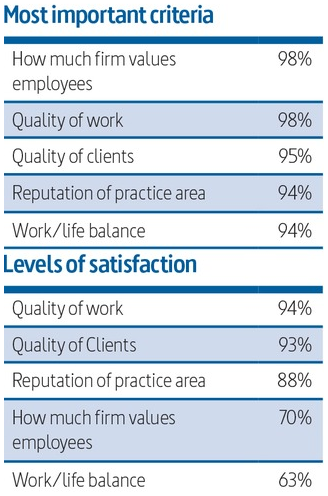Satisfaction survey finds majority of junior lawyers feel fulfilled despite career concerns

Most junior lawyers are both fulfilled by their professional lives and enjoy a reasonably healthy work/life balance despite concerns over the quality of management, bonus schemes and career prospects at their firms.
These are the headline findings of the 2015 Legal Week Intelligence employee satisfaction survey, which questioned 2,076 fee earners in 16 UK, City and international firms.
 The survey – now in its 12th year – was for the first time conducted in association with leading employee survey company Best Companies Group. Participating firms included Allen & Overy, Reed Smith, Burges Salmon and Shoosmiths. It asked respondents to rate various aspects of their professional lives, both in importance and satisfaction (see table).
The survey – now in its 12th year – was for the first time conducted in association with leading employee survey company Best Companies Group. Participating firms included Allen & Overy, Reed Smith, Burges Salmon and Shoosmiths. It asked respondents to rate various aspects of their professional lives, both in importance and satisfaction (see table).
Work/life balance – one of the most important criteria and a continual bugbear – scores relatively well with 63% being satisfied and just 17% dissatisfied.
Satisfaction levels for the other most important criteria were, for the most part, exceptionally high. Employees especially praised their firms for the quality of work (94%); quality of clients (93%) and the reputation of the firm’s practice area in which they operate (88%).
In contrast, while employees rate feeling valued as one of the most important aspects of the workplace (98%), only 70% were satisfied with how valued they are at work, with 14% dissatisfied.
Clint Evans, director of brand & talent RPC, says: “The overall results of the survey which suggest that, for the most part, lawyers are happy in their jobs is encouraging, but there’s no room for complacency. As Generation Y starts to account for a higher proportion of our sector and those we advise – we need to be open to new ideas, adaptable and flexible, so that we continually work smarter to meet the changing wants and needs of our people.”
The survey found a significant minority of employees (14%) are dissatisfied with the level of internal communication at their firms while 13% complain of a lack of recognition and praise for doing good work.
But overall, the greatest single management problem identified by fee earners is the perception that promotion/progression opportunities are not equally available for all: 21% identify this as an area of dissatisfaction, and a key issue for determining their future career.
Unsurprisingly, remuneration ranks as a key motivator. Although satisfaction with current salary levels (61%) outweighs dissatisfaction (23%) by nearly three to one, bonus schemes (or the absence of them) attract the highest level of unhappiness among all criteria in the report: 38% are dissatisfied while only 33% are satisfied. This endures as an area that some firms need to address for their overall remuneration packages to remain competitive.
There was less disquiet about billable hours with targets not regarded as unduly onerous by most: 67% were satisfied, 12% dissatisfied, with 31% not answering either way.
While most firms have made big strides in diversity over recent years, some respondents believe that more still needs to be done: 12% express dissatisfaction with their firm’s progress.
Overall, ambition reigns supreme. Most lawyers want to progress within their firm rather than leave.
Predictably, the draw of partnership within their firm is the biggest single career aim: 42% give it the highest rating set against 19% who aspire to a senior role below partner level and 5% who want to remain as an assistant.
But retention is an issue with 34% having ambitions outside their firm, comprised as follows: 13% who aspire to move in-house, 10% who want to move to a career outside law, 6% who are already aiming for partnership in another firm, with the other 5% wanting to start their own practice.
On the report’s main work/life balance finding, Burges Salmon’s chief people officer, Robert Halton (pictured), concludes: “Sixty-three per cent is not a bad score at all. Many people work just to facilitate them doing other things. But lawyers don’t stop when they leave. Work is part of their satisfaction in life.”
Supporting this argument, 41% of respondents cite the intellectual challenge of the work as the most important motivator for choosing a legal career, well ahead of 15% stating financial reward as the initial number one priority.




























